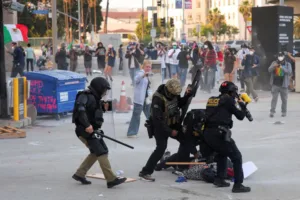Communist Party of the Philippines
May 4, 2016
The Communist Party of the Philippines (CPP) acknowledges with keen interest Mayor Rodrigo Duterte’s promise to immediately declare a ceasefire in order to pave the way for peace negotiations if ever he wins the upcoming presidential elections.
Duterte’s promise, indeed, strikes a chord with the Filipino people who have long aspired for substantial progress in NDFP-GRP peace negotiations after more than 15 years of being stalled by GRP and AFP obstructionism.
Since 2001, the Arroyo and Aquino regimes prevented the NDFP-GRP peace negotiations to prosper. More than 20 peace consultants and personnel of the NDFP were imprisoned in violation of the Joint Agreement on Safety and Immunity Guarantees (JASIG). The Aquino regime has firmly shut the doors to peace negotiations by refusing to discuss such fundamental issues as land reform and
national industrialization which it summarily dismissed as “ideologically charged” in adamant refusal to recognize these as basic demands of the Filipino people.
Both regimes sought to defeat the revolutionary forces in the battlefield through military campaigns of suppression Oplan Bantay Laya I and II and Oplan Bayanihan. Arroyo and Aquino both miserably failed to stymie, much less defeat, the people’s armed struggle.
A Duterte presidency can push forward peace negotiations by upholding all previous agreements from the foundational The Hague Joint Declaration of 1992 to the Comprehensive Agreement on Respect for Human Rights and International Humanitarian Law(CARHRIHL) of 1998 and complying with the GRP obligations under the JASIG by ordering the release of all NDFP consultants and political detainees.
On Duterte’s intention to be RP’s first Left President
Speaking before NPA Red fighters last week, Duterte declared he will be the first “Left President” of the Philippines if he wins the elections. In the hope of boosting his chances of gaining popular support, he issues radical soundbytes about destroying the government and setting-up a new one.
Talk is cheap, however, especially during the electoral campaign. If he ever wins, he will still have to prove himself in practice: Will he be like Venezuela’s Chavez who stood up to the bullying of the US government and promoted nationalization, a social welfare state and the arming of the people in Venezuela? Or will he be like Greece’s Tsipras who defended the welfare state in political debate but who later acceded to IMF and EU austerity policy-impositions?
Despite his “radicalisms”, Duterte has, in fact, yet to espouse any fundamental shift from the general run of neoliberal economic policy of the past 30 or so years. On the contrary, he has promised to expand privatization and deregulation and declared plans to provide state funds to Lucio Tan and his ilk of big bourgeois compradors; and liberalization of trade by allowing the dumping of surplus steel from China.
The US government, through its ambassador, has expressed displeasure with Duterte over a joke he made at the expense of a rape and murder victim in 2009 recently exposed in social media. Such a remark, in fact, expresses the anxiety of US officials over Duterte who, with his shoot-from-the-hip statements, might prove a bit too unwieldy and unpredictable for the US.
It is also a not so subtle advise for Duterte to more firmly toe the US line, especially with regard establishing US military bases and expanding presence in the Philippines through the EDCA, and containing the expansion of China.
Aware that US control over the elections propelled Benigno Aquino III to the presidency in 2010, Duterte may be compelled to secure his ties with the US. Or he can choose to make a break and seek support elsewhere.












